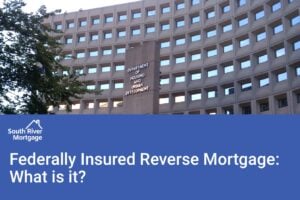
By Tyler Plack
Tyler Plack is the President of South River Mortgage. Tyler holds an active FHA Direct Endorsement (DE) underwriting certification and is the author of The Retirement Solution: Maximizing Your BenefitTyler is a seasoned entrepreneur and real estate investor renowned for his expertise in reverse mortgages and his commitment to addressing seniors' equity challenges. Tyler brings a unique perspective to his ventures, having built several successful companies throughout his career. His insights are frequently sought by industry publications, where he is recognized for his vast knowledge in the realm of reverse mortgages.
An avid investor in income-producing properties, Tyler is dedicated to helping seniors navigate their financial needs with compassion and expertise. When Tyler is not helping solve America's retirement crisis, he is a skilled pilot flying airplanes for fun.
Federally Insured Reverse Mortgage (HECM)
The federally insured reverse mortgage program is known as the Home Equity Conversion Mortgage (HECM) loan and is backed by the US Department of Housing and Urban Development (HUD). Here is a short summary:
What does it mean when a lender says their reverse mortgage program is federally insured?
Simply put, it means that the reverse mortgage is backed by the federal government. The Home Equity Conversion Mortgage (HECM) is the only federally insured reverse mortgage program.
The HECM is insured by the Federal Housing Administration (FHA), which is a division within the U.S. Department of Housing and Urban Development (HUD).
To effectively compare the federally insured reverse mortgage program to others, we need to take a moment to go over types of reverse mortgages.

Types of Reverse Mortgage Programs
There are various reverse mortgage programs, each with its own advantages and disadvantages.
Generally, reverse mortgages fit into three different categories:
- Federally Insured Home Equity Conversion Mortgage (HECM)
- Proprietary Reverse Mortgage
- Single Purpose Reverse Mortgage
Federally Insured Reverse Mortgage (HECM)
The federally insured reverse mortgage program is known as the Home Equity Conversion Mortgage (HECM) loan and is backed by the US Department of Housing and Urban Development (HUD).
The HECM loan is available for homeowners aged 62 or older who have substantial equity in their homes. The HECM allows homeowners to choose from several different ways to receive the loan proceeds. These include:
- A “term” option – Fixed monthly cash advances for a set period of time
- A “tenure” option – Fixed monthly cash advances for as long as you live in the home
- A “line of credit” option – Allows you to draw loan proceeds as you desire, until you have used the full amount
- A combination of a monthly payment and a line of credit
Learn more at the HECM eligibility requirements
Proprietary Reverse Mortgage
The proprietary reverse mortgage is a loan program that is not backed by federal government. Proprietary reverse mortgage loans are arranged by individual lenders. These loans are also sometimes referred to as “jumbo reverse mortgages”.
Because the loans vary by lender, the requirements to obtain a proprietary reverse mortgage may also vary. Here’s everything you might want to know about jumbo reverse mortgages.
Single Purpose Reverse Mortgage
The single purpose reverse mortgage is the rarest form of reverse mortgage. These are loans that are arranged by state agencies or nonprofits. Single purpose reverse mortgages are not available everywhere and can only be used for the purpose they are provided.
The lender on a single purpose reverse mortgage may require that the loan proceeds be used to pay for a specific item. For example, they may require home repairs, home improvements, or property taxes.
Are You Eligible for a Reverse Mortgage?
(Find out in 60 seconds)
Federally Insured Reverse Mortgage Pros
There are some advantages to the federally insured program.
- HECMs tend to offer access to a higher percentage of the home equity, although this varies by situation. Use a reverse mortgage calculator to find the best option.
- If the lender fails to make payments to you, you are protected by the Federal Housing Administration, who will step in and make payments to you on behalf of the lender.
- Interest rates tend to be lower on the HECM than on proprietary loan programs
- HECM loans are available in all states across the country. Proprietary loans may only be available in some states.
Federally Insured Reverse Mortgage Cons
There are also some disadvantages to the federally insured reverse mortgage program.
- Cannot lend above the Federal Housing Administration annual lending limit (currently $1,209,750)
- Borrowers are charged ongoing mortgage insurance premium (currently 0.5% of loan balance)
- Borrowers are charged upfront mortgage insurance premium (currently 2% of the lesser of the home value or lending limit)
- May not be able to access all loan proceeds up front
How to decide on a federally insured reverse mortgage or a proprietary loan?
The decision to obtain a federally insured reverse mortgage loan or a proprietary loan can be deeply personal and can vary with the individual situation. For this reason, we always suggest to obtain a reverse mortgage quote where a reverse mortgage expert can present you with the various options.
To avoid scams, make sure you are working with a federally licensed reverse mortgage lender. South River Mortgage is a federally licensed reverse mortgage lender that maintains HUD approval and does business in most states. See all of South River Mortgage’s licensing information.
Sources
In researching this article, we consulted the following sources, which may be helpful for further research.


